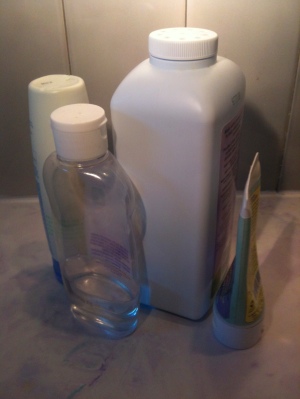 Over the last few years I have gradually been phasing out many cleaning and personal hygiene products that have chemicals like the one mentioned below. As more research comes out about the effects of these chemicals, I’m increasing happy that I have chosen alternatives. There are many many options for alternative cleaners and shampoos and creams. I deeply hope that all of you will give this some consideration.
Over the last few years I have gradually been phasing out many cleaning and personal hygiene products that have chemicals like the one mentioned below. As more research comes out about the effects of these chemicals, I’m increasing happy that I have chosen alternatives. There are many many options for alternative cleaners and shampoos and creams. I deeply hope that all of you will give this some consideration.
BABIES ABSORB PHTHALATES FROM BABY PRODUCTS
Read the article in Reuters.
Babies absorb phthalates from baby products
Mon Feb 4, 2008 10:35am EST
By Megan Rauscher
NEW YORK (Reuters Health) – A new study suggests that baby lotion, baby powder, and baby shampoo may be exposing babies to potentially harmful chemicals called phthalates.
“At this time, we do not know what the potential long-term health effects might be, but there is a large body of animal studies to suggest developmental and reproductive toxicity (from phthalates) and a few human studies with changes in health outcomes as well,” Dr. Sheela Sathyanarayana told Reuters Health.
Phthalates are used to make plastics flexible and stabilize fragrances, and are found in a plethora of consumer products including toys, personal care products and medical equipment.
As reported online today in the journal Pediatrics, Sathyanarayana, from the University of Washington, Seattle, and colleagues measured the levels of nine different phthalate breakdown products in urine from diapers of 163 infants aged 2 to 28 months.
All of the urine samples contained at least one phthalate at measurable levels, they report, and 81 percent of the samples had measurable amounts of seven or more phthalates.
“We found that reported use of baby lotion, baby shampoo, and baby powder was associated with increased concentrations of monethyl phthalate (MEP), monomethyl phthalate (MMP), and monoisobutyl phthalate (MIBP) in infant urine,” Sathyanarayana said.
This association was strongest in young infants less than 8 months old, “who may be more vulnerable to developmental and reproductive toxicity of phthalates,” the investigators note in their report.
At present, U.S. manufacturers are not required to list phthalate contents on products’ package labels, making it hard for parents to make informed decisions, the investigators point out.
“If parents want to decrease exposures for their children, they can try to use lotions, shampoo, and baby powder sparingly unless otherwise indicated for a medical reason,” Sathyanarayana suggested.
SOURCE: Pediatrics, February 2008
**********************************************************************
I’m sure many of you are already using alternative products, why not share your favorites here with us? Maybe we will all discover a new product that is great and healthy.
Marie
Below is a Comment from Brandy – that is so worthwhile, I’m posting it into the main part of the blog entry.
Like you Marie, I, too, continue to phase out products from my baby’s and my own personal hygiene routine. A site I love is www.cosmeticsdatabase.com and you can search all of the make-up, skin care, and hair care products that your family uses on a regular basis. Products are analyzed by the not-for-profit group called the Environmental Working Group and they list all of the chemicals, noting their effects (eg. reproductive toxicity, neurological toxicity, carcinogenic etc) and rate how “bad” the overall product is on a scale from 1-10. Personally I love lines like Burt Bees, Aveda, and some body shop lines, but it is a challenge to find non-toxic products.
The other night I watched a documentary on CBC called “The Disappearing Male”, and wow (!), what an eye opener. It explores the probable impact of phtalates and other chemicals on our children, male babies in particular. Many experts feel there is a strong link between these chemicals and decreased fertility in adult men (as compared to their grandfathers who had 50% higher sperm counts!), smaller penis size and increased rate of genital defects in male infants, and a whole host of other health concerns (autism, behavioural problems, chronic diseases…). You can watch the entire documentary (45 min) at:
http://www.cbc.ca/documentaries/doczone/2008/disappearingmale/index.html
If you enjoyed reading this article, you might also like these two posts.
Sleep Training for a  Baby’s Point of View
Baby’s Point of View
OK, here’s my situation. My Mommy has had me for almost 7 months. The first few months were great– I cried, she picked me up and fed me, anytime, day or night. Then something happened. Over the last few weeks, she has been trying to STTN (sleep through the night). At first, I thought it was just a phase, but it is only getting worse. I’ve talked to other babies and.. Keep Reading
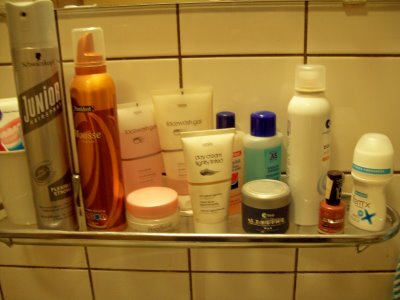 Can what’s on the shelves in your bathroom hurt you?
Can what’s on the shelves in your bathroom hurt you?

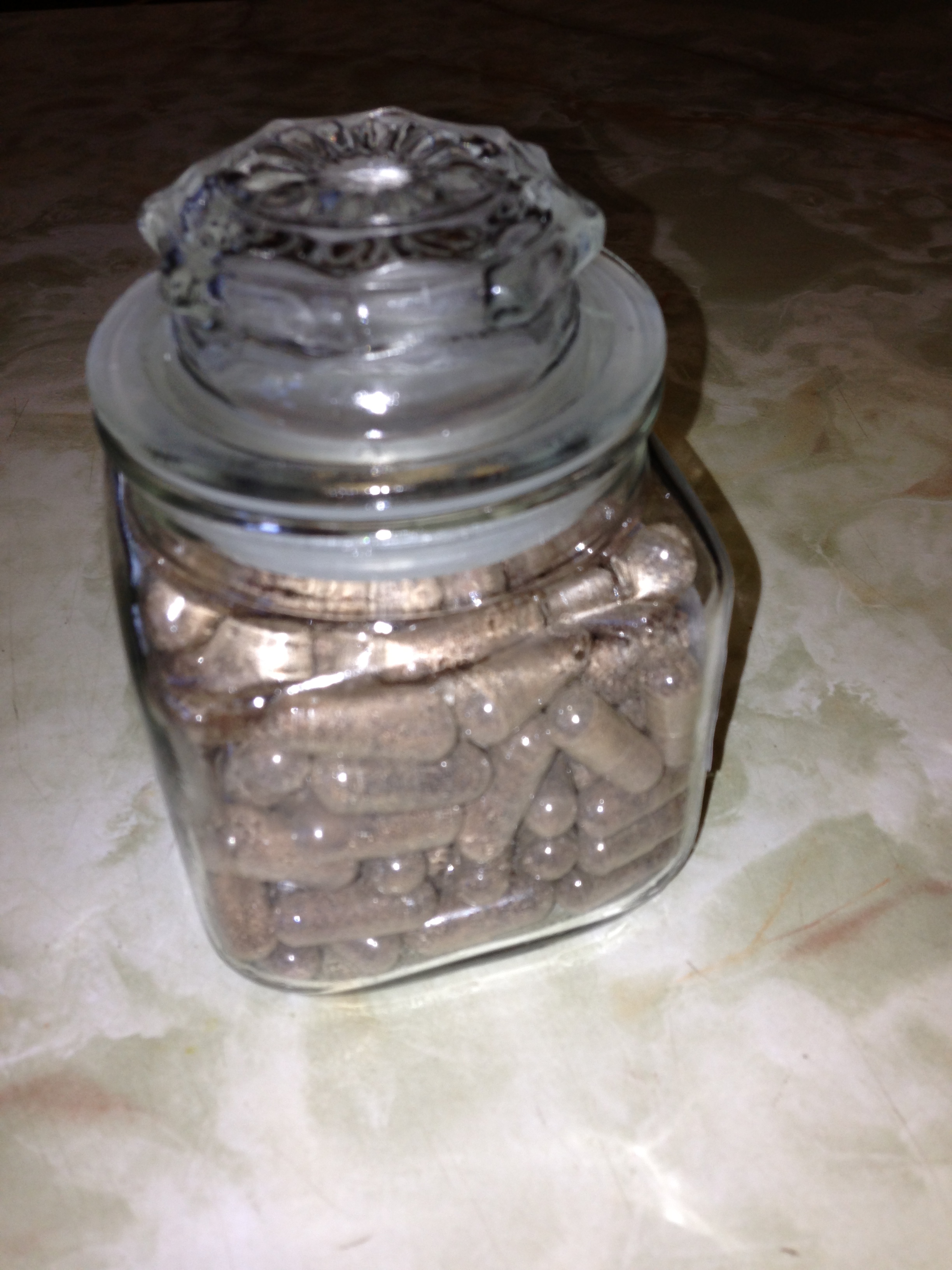
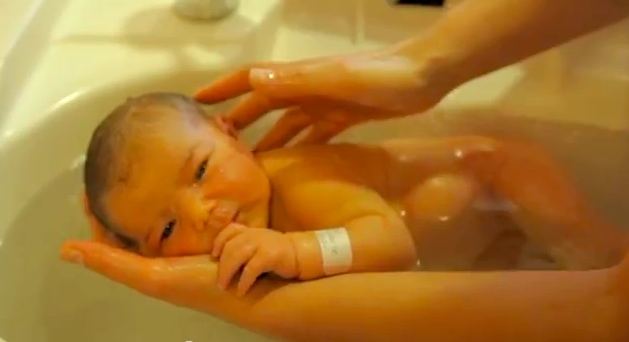

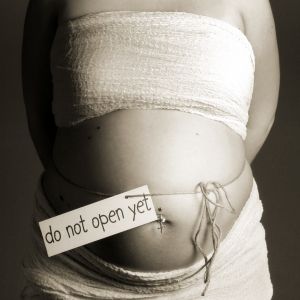
3 thoughts on “What kinds of products are you using with your baby? Are baby products safe?”
Like you Marie, I, too, continue to phase out products from my baby’s and my own personal hygiene routine. A site I love is http://www.cosmeticsdatabase.com/ and you can search all of the make-up, skin care, and hair care products that your family uses on a regular basis. Products are analyzed by the not-for-profit group called the Environmental Working Group and they list all of the chemicals, noting their effects (eg. reproductive toxicity, neurological toxicity, carcinogenic etc) and rate how “bad” the overall product is on a scale from 1-10. Personally I love lines like Burt Bees, Aveda, and some body shop lines, but it is a challenge to find non-toxic products.
The other night I watched a documentary on CBC called “The Disappearing Male”, and wow (!), what an eye opener. It explores the probable impact of phtalates and other chemicals on our children, male babies in particular. Many experts feel there is a strong link between these chemicals and decreased fertility in adult men (as compared to their grandfathers who had 50% higher sperm counts!), smaller penis size and increased rate of genital defects in male infants, and a whole host of other health concerns (autism, behavioural problems, chronic diseases…). You can watch the entire documentary (45 min) at:
http://www.cbc.ca/documentaries/doczone/2008/disappearingmale/index.html
Thanks so much Bandy. That’s awesome information. I’m looking forward to checking the products that I have in my house on the website that you recommended (http://www.cosmeticsdatabase.com/). I’m sure others will find it helpful too.
Hello my name is Richard Swallow my wife Nova and I are friends with Marie and her husband Harlan. My wife and I both work full time. I am a manager with Capital Pontiac and my wife works at William Booth Special Care Home and between the two of us we both put in approx 110-120 hrs per week and that’s just work. Now when people tell me they don’t have any time, we know what they are talking about. We are firm believers in that if you keep doing the same thing over and over again and expect a different result you are going to stay right where you are and not go anywhere because you are spinning your wheels. So we have decided to not do the same thing and try something different. My wife and I have a home based business though Melaleuca the Wellness Company and we are working towards what most people dream of having it is called wellness. We are talking about personal, environmental, financial and physical wellness. We work about 10 to 15 hours per week introducing a win win opportunity to people we know and or meet on the street.
Our company does not compete with Amway/Quick star, Shaklee, Herbalife, Mary Kay, Arbonne, Gogi Juice, or Usanna just to name a few. We’re not an MLM, We don’t inventory, sell, deliver or touch people’s products. We are a catalog shopping company and people order through an 800# or online 24 hours a day. We actually compete against Proctor & Gamble, Colgate Palmolive, Johnson & Johnson, Lever Brothers and other manufacturing companies. We are one of the fastest growing companies in all of America. We are exploding with our environmentally safe and friendly (Go Green Products). Our products are 30 to 40 percent cheaper than grocery store or Wal-Mart prices. We manufacture products like pharmaceutical, nutritional, personal care, sport fitness, laundry, bathroom, oral hygiene, cosmetics, and weight loss and so on. Products that you and your family are going to use today, tomorrow, next week and for the rest of your life. Without spending any new household money. Now, who uses those types of products in the civilized world? Everyone!
With our 95% reorder rate our products are so great that once people use these everyday products and get them into their homes, they fall in love with them and they keep shopping month after month year after year. It takes about 30 to 45 minutes so that you can make an educated, informed decision about our great company. We will be honest when people hear this information, they join because it makes common sense to save money on great nutritional products and get the poisons and toxins out of their home.
Remember in our first paragraph when I talked about wellness…Well We are even busier than before we started Melaleuca…but honestly…We are already seeing some of those wellness benefits we were talking about… Let us show you how to start your wellness today!
I also encourage anyone to use the cosmeticsdatabase.com and check out our Melaleuca products. You will be impressed. Just type Melaleuca in the search bar.
If what you have just read interests you and you are interested in switching stores and trying our products risk free and or you would like to get some more information on our revenue sharing.
Please call us anytime.
Thank you
&
God Bless
Melaleuca Marketing Executives
Richard & Nova Swallow
2835 – 6th Avenue North
Regina, Sask
S4R-0P3
res-543-6278
cell-591-2088
Personal web site http://www.teamvitality.com/swallow
Company web site http://www.melaleuca.com click take a tour.
E-mail swallowsmelaleuca@live.ca